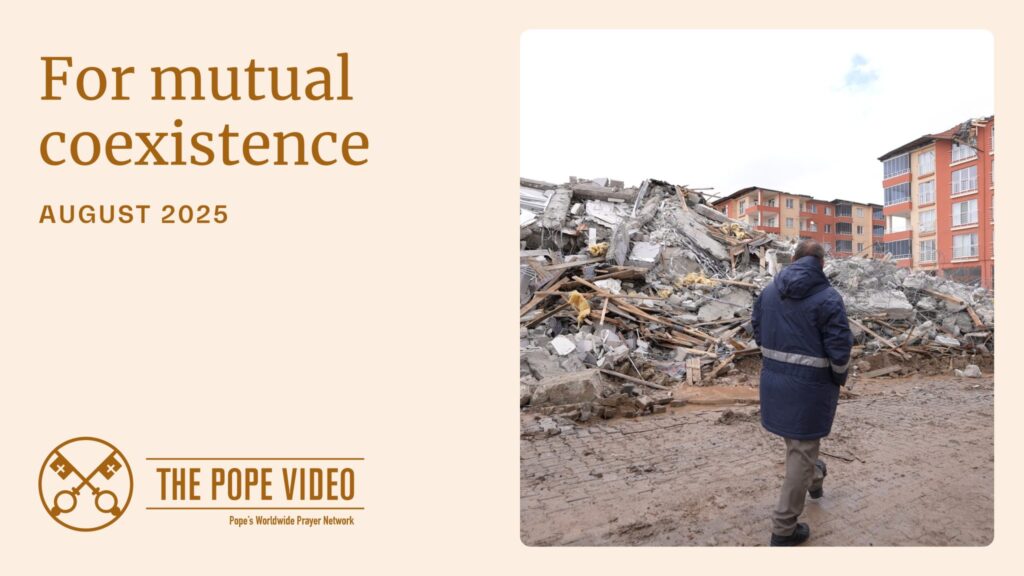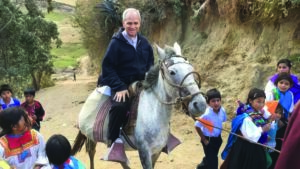
Each month, the Pope asks for our prayers for a specific intention. In August, Pope Leo XIV’s prayer intention is for mutual coexistence.
Pope Leo XIV’s first words to the world were words of peace. He has seen violence. He has, as we all have, watched nations torn apart by crises. He writes, “There are so many conflicts, so many wars; there is need to work for peace, to pray with trust in God, but also to work”. What can I do? As Pope he can speak to world leaders. “Thank God the voice of the Church is still important,” he writes. He invites us this month to join with him in prayer for peace, for dialogue, for bridges to peace. I am reading the Gospel of the small amount of yeast that causes the whole of the dough to be leavened. Our troubled planet needs leavening. Could this call to prayer be the yeast?
Consider this. Here is a man who grew up in South Chicago, USA – Rob to his family and Bob to his friends. He felt called to give his life to serve God in the Augustinian tradition. He was ordained a priest; he studied as a preparation for mission. He was sent to an impoverished area in Peru, even while completing the last two years of his doctorate.
 Father Prevost, this parish priest, this scholar, has ‘fitted in’ among his people. He listens to them. They live simple, impoverished and endangered lives. He knows them by name, laughs with them and weeps with them, occasionally cooks for them. He celebrates Eucharist with them even where there is no church building. He recognises the potential for leadership among these women and men of his vast parish. He is also a man of prayer.
Father Prevost, this parish priest, this scholar, has ‘fitted in’ among his people. He listens to them. They live simple, impoverished and endangered lives. He knows them by name, laughs with them and weeps with them, occasionally cooks for them. He celebrates Eucharist with them even where there is no church building. He recognises the potential for leadership among these women and men of his vast parish. He is also a man of prayer.
Throughout Peru, starting in the south of the country, guerrilla fighters known as the Shining Path were wreaking havoc. They claimed that violent revolution was necessary to change the pitiful poverty of the poor. They would overthrow the government and seize power. More peaceful means of bringing about social change stood as an obstacle in their way; they would not tolerate this.
They called themselves the Shining Path and beginning in the south of the country, seized power by violence.
Meanwhile the Catholic Bishops of Peru promoted a new image of Church. The people of the parish, including the poorest, could be supported to take leadership in their own communities. The local people understood the problems, they could reflect together about solutions, they could take action. Given respect and support, these men and women became skilled leaders. In Fr Prevost’s parish, there were co-operative soup kitchens and other ways of social services. In distant places where a priest could visit only occasionally, there were local lay leaders preparing a liturgy for Sunday after Sunday.
There are Josephite Sisters ministering in Peru, in the south of the country. On a night in 1991, Irene McCormack, an Australian Sister, was taken captive by Shining Path fighters and forced to lie face down on the ground in the village square beside some lay leaders, each captured from their own homes. The guerrilla leaders did not listen to the village people pleading in vain for the captives to be spared. All five were shot through the head: Ruben, Augustine, Pedro, Alfredo and Irene.
Irene had written, “I have come to understand that effective action is a way of loving”. It seems that Fr Prevost up in the north of the country had come to that same conclusion.
While the guerrilla war was less fierce in the north of Peru, living close to injustice and danger surely leaves its mark. The scholarly Fr Prevost is known for his compassion. We hear him saying ‘peace’. There are practical solutions.
Religious congregations, Priests or Brothers or Sisters choose their Congregational Leaders through a process of prayer and silent prayerful voting. And so it was, that Fr Prevost was called into leadership of the worldwide Augustinian community; he was a relatively young man. For almost fourteen years he served in that role and traversed the world, visiting the Augustinian communities, listening and building bridges of understanding across nationalities. He can converse in many languages. He has spent time with Augustinian communities in more than 40 countries, including Australia.
After that leadership time, he returned to Peru as a simple parish priest with Peruvian citizenship, then as Bishop, then as Cardinal, always speaking for unity, and above all listening to his people. When called to be Pope he stood behind the microphone with an excited crowd jammed in the Vatican square in front of him and spoke in Spanish to his flock who were watching the TV in Peru.
This international missionary, with many bridges already crossed, is our Pope. He has worked in international ministry during all his priestly life. He is a peacemaker.
Let us join with him in the prayer intention of August 2025.
Joan Healy rsj
